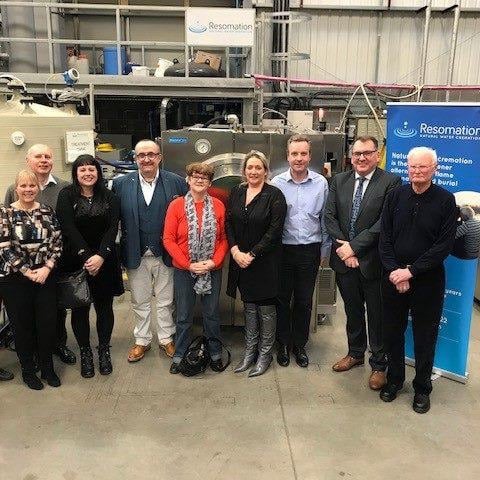
- UKSOC Tutors and Celebrants at recent visit to Resomation Limited.
Resomation: known as water cremation, is the new alternative to flame cremation and burial.
Giving people a new choice at the end of life, water cremation is a gentler, environmentally friendly option that allows a natural process using water instead of flames.
End of Life Choices
In today’s world where the ecosystem and the future of the planet are being seriously challenged by our rapidly growing population we need to consider our choices more thoughtfully.
Choosing water cremation over flame cremation and burial comes down to each individual and in some cases driven by tradition or religious beliefs.
Water cremation has been independently shown to have the lowest and indeed little environmental impact at all compared to burial and flame cremation and that may be enough to allow the individual to choose it. This is especially true for those of you who have lived your lives with a very acute environmental awareness and concern for our planet and have consistently recycled and made green choices that have the least impact on the environment. Water cremation certainly allows you with your end of life funeral choice to express that concern in a very positive manner.
For others it is simply the inner fear during life of fire or burial inexplicably translated to an end of life situation that makes choosing water cremation seem a gentler option and the right feeling choice for them. You will also be making an environmentally positive decision.
Flame cremation faces environmental challenges including the harmful airborne particle emissions, harmful mercury release from dental amalgam and a high energy consumption that leads inevitably to a large carbon footprint adding to the greenhouse gas effect and climate change.
Even at end of life, human beings can still have a final negative impact on our planet. For one individual that might not seem significant but there are currently over 7 billion people on the planet and rising fast and estimated to reach 9 billion within 20 years. Collectively our future choices can make a difference.
Water cremation is already proving a popular choice for people overseas and is legally approved in 15 US states. In the UK, plans to introduce water cremation are progressing. There are no technical or legal reasons why it cannot be offered as an end of life option and regulatory approvals are currently being explored so that it can be offered to the public.
The key environmental benefits of Resomation are clear. Resomation is the positive change the planet needs and the option many will now choose.
The resomation process explained
Superficially, the resomation process is incredibly similar to modern cremation. In fact, up until the body is committed and passes from view, a resomation service would be no different from that of a normal cremation service. This means that many current crematoria will be able to install a stainless steel resomation tank alongside their existing cremation technology, meaning that they could become dual function in the future.
However, once the body is committed an entirely different process begins. The resomation tank, known as a resomator, is in fact a special type of pressure chamber that allows a body to be immersed in a special solution of potash lye and water – a process also known as alkaline hydrolysis. Gas powered steam generators than build the pressure inside the tank until the temperature rises to the required level and a chemical reaction takes place that separates the body into two distinct substances, usually over a period of three to four hours. These substances are an ash, consisting of calcium phosphate from the bones, and a bio-fluid that’s made up of salts, sugars, peptides and amino acids. While the fluid is drained off and disposed of, the ash can be collected and either kept in an urn or scattered, much like what happens currently following a cremation. This liquid is free of any genetic material.
The benefits of resomation
Resomation is considered better than modern cremation processes for a number of reasons, though its greatest benefit is a reduction in the amount of energy required to complete the process. Most research suggests that resomation consumes one third of the amount of energy that cremation does, while it also drastically lowers carbon and mercury emissions. Finally, it also provides a solution to many issues associated with burial, such as limitations on the amount of land available for burial sites and rising burial costs.
Legal status of resomation
As a new technology, the precise legal foundations surrounding the practice are yet to be fully defined and solidified. The UK is yet to legislate specifically on the matter. However, in Scotland, the Cremation and Burial Act 2016 has provided a clear platform for the introduction of resomation technology and it is worth noting that in England there seems to be no legal opposition to its implementation as long as it complies with all existing building and environmental regulations.
While it seems clear that resomation is a viable alternative to cremation, it remains to be seen whether it will be a popular one. Though trends in the funeral industry do suggest that people are prepared to depart from tradition and opt for more personalised funerals that reflect their own beliefs and preferences, it is not known how customers will react to the new technology.
Perhaps, as the issues facing traditional burial methods become more acute, we will see a shift towards more environmentally and space friendly methods like resomation, although only time will tell.
Thanks to Resomation Limited



